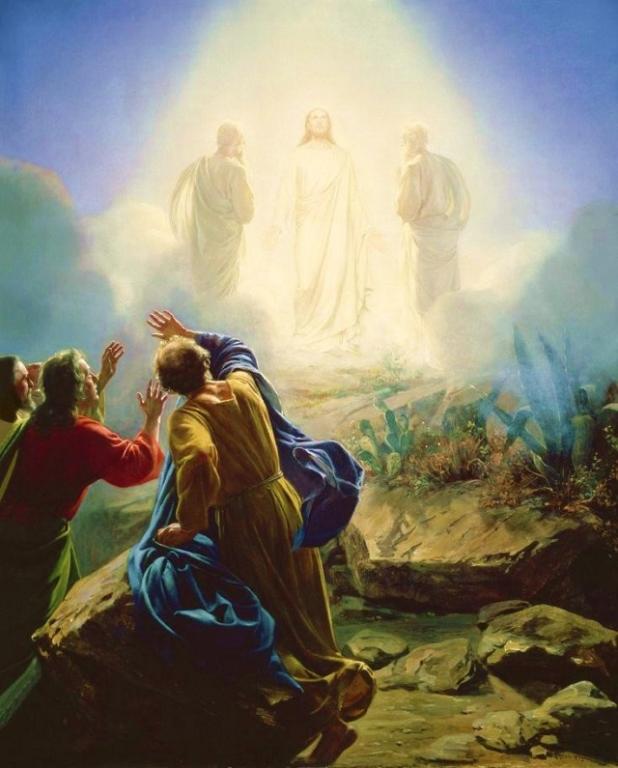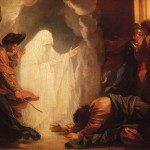Dialogue with an Inquiring Baptist

Transfiguration of Jesus [Elijah and Moses also appearing], by Carl Heinrich Bloch (1834-1890) [public domain / Wikimedia Commons]
***
(12-1-08)
***
It is not hard to see that she [Mary] should be honored. But it is difficult to foster veneration when it is not clearly spelled out in Scripture. Sola Scriptura may be true or false, but most adherents to it are at least honest if they do or do not see something there. Most sola Scriptura adherents do not see this in the Bible, myself included.
Big topic (and I’d be happy to discuss it at length). For now, let it suffice to say that Marian veneration is not a big theme of Scripture, for a few reasons. First of all, the primary and overwhelming intent of the NT is to present and glorify and promote worship of our Lord Jesus Christ. That’s what Mary would have wanted. She is all about her Son, not herself. If it hadn’t been that way, early Christianity may well have gone off into a truly heterodox direction: placing Mary higher in the scale of things than she is.
Secondly, this notion and many others are presented only implicitly or in kernel in the NT. They were more highly developed later on. All doctrines develop. Some do more than others, or at a faster rate than others, or more so in relation to what was initially presented in the NT, compared to other doctrines (such as, e.g., justification and salvation, where there is a ton of stuff in the NT). Development of doctrine is a huge question and consideration that we can get into, if you like. It’s just about my favorite topic in theology, and was key to my own conversion.
There is very little, for example, about original sin in the Bible, yet almost all Protestants accept it. There is far less about that than there is about purgatory. There is more in the Bible about baptismal regeneration (about eight or so passages) than there is about faith alone (none, when St. Paul’s overall thought on the topic is taken into consideration). There are just one or two references to the Virgin Birth.
I contend that there is nothing about sola Scriptura (yet Protestants have made it one of their pillars and their formal rule of faith). There is clearly nothing whatsoever in the Bible about the canon of the Bible (what its own books are). No one disagrees with that. So even Protestants believe things that are either not in the Bible at all, or only implicitly or in a few passages only. Thus, they are not entirely consistent within their own framework of sola Scriptura.
As you know, sola Scriptura requires everything that is believed to be in Scripture (and for the most part, explicitly so, as well). We don’t believe that. We deny the premise. Our belief is that everything is in Scripture (this is called material sufficiency of Scripture, as opposed to formal, which is sola Scriptura), at least in kernel form, or deductively, or indirectly, based on other clear indications, and that every Catholic doctrine is harmonious with what we see in Scripture. So it becomes a question of stepping back and examining whether sola Scriptura itself is worthy of belief and is taught in Scripture itself. We say no on both counts.
It is difficult to accept this belief without the aid of Church history and Tradition.
We reply that both of those are explicitly sanctioned in Scripture, so where is the problem in the first place?
And I have read several conversion stories stating that the veneration of Mary is often a big and final hurdle towards Catholic conversion. It may be difficult for you to see, but it is nevertheless commonplace.
I completely understand it, because Protestants ponder the whole issue of Mariology very little. For most Protestants, the height of their Marian reflection is having a miniature statue of her on the hearth (in a manger) at Christmastime, and when singing Silent Night (written by a Catholic priest). We think about her a bit more often and deeply, and have bigger statues. :-)
The logic is not so easy to see from our vantage point.
Exactly. When one has certain premises, things that go against those premises will be difficult to grasp. My point is that maybe the Protestant premises are wrong. That’s the challenging thing for any Protestant to face or grapple with. I understand the process. I and other converts went through it ourselves.
I don’t hear anyone talking about Auntie Elizabeth, Cousin Johnny, or Step-Daddy Joseph. Please forgive me if this comes across as disrespectful to those who are greater than myself; that is not my intention. My point is we do not attach the same level of veneration to those family members (albeit less close family relationships when compared to a mother) of Jesus. Mary is seen, from out vantage point, as an exception as great as she may be.
Your premises don’t allow it, because Protestantism wrongly sees any veneration or honor towards a creature as somehow detracting from worship and adoration of God, as if the two were even remotely the same thing, or as if it were a zero-sum game (honoring God’s creatures that are what they are solely because of His grace, as somehow a dishonoring of Him, or idolatry).
Or take our praise of Martin Luther or Billy Graham or DL Moody or John Calvin or… it is quite odd.
In many respects, the high honor paid to those figures is not unlike our veneration. But because many Protestants do not properly comprehend what Catholic veneration is in the first place, they fail to see the parallels.
Forgive us Protestants, but this idea is foreign to our ears, though we no doubt practice it. Development of doctrine is not a common phrase (I have some seminary level education and have never heard this term apart from Catholic web pages). It sounds too much like ‘cleverly devised tales’ to us. I do not think the two are synonymous. It is an idea I am personally slowly warming up to. But I am still unsure.
That’s fine. We’re offering a friendly challenge. In fact, development is not simply a Catholic concept. The late Jaroslav Pelikan: one of the leading Church historians, wrote a five-volume work on development of doctrine, when he was a Lutheran (later he became Orthodox). Pelikan also was the primary editor of the 55-volume English set of Luther’s Works.
Philip Schaff, another famous Protestant historian, wrote quite a bit on the topic. Here is one of my introductory papers: Development of Doctrine: A Corruption of Biblical Teaching? [1995]. See also other papers about veneration:
*
Veneration of and Bowing Before an Angel in the Bible (Joshua 5:13-15) [Facebook post and discussion, 9-7-13]
*
New (?) Analogical Biblical Argument for Veneration of the Saints and Angels from the Prohibition of Blasphemy of the Same [8-8-15]
*
*****













